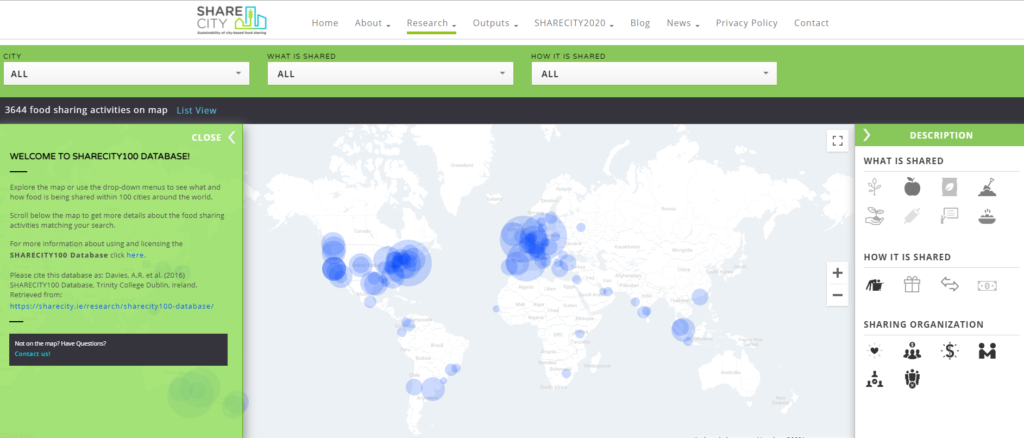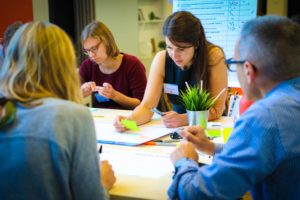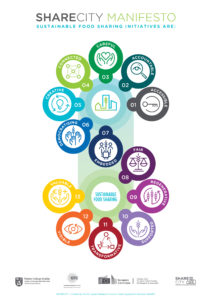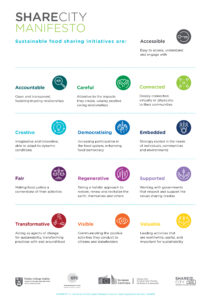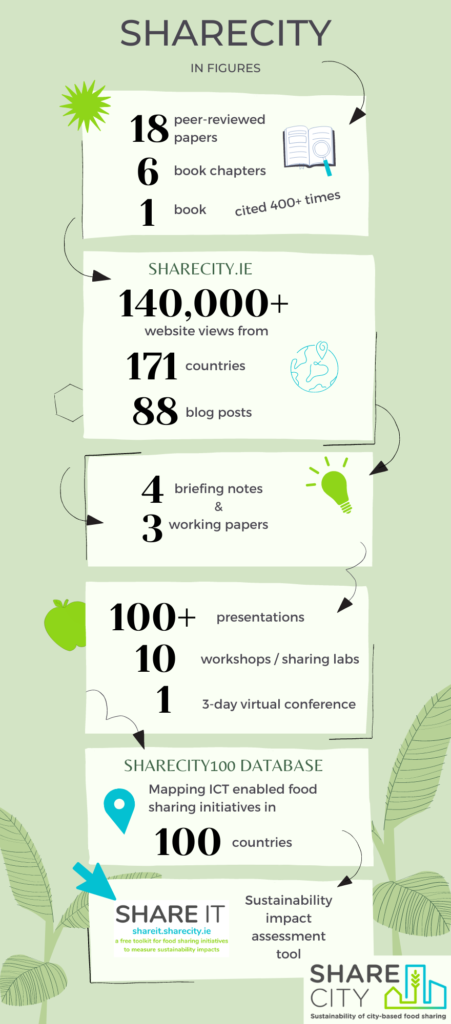SHARECITY 5 years on: Not the end, only the beginning
Published by SHARECITY on the 20th July 2021.

This July marks the end of the ERC-funded phase of the SHARECITY project! Since 2016, our research has taken us from our home base in Dublin to cities across Europe, Asia, Australia and North America, investigating contemporary urban food sharing practices and their impacts on society, the economy and the environment. In this blog post, we reflect on the highlights over the course of the project and look to the future for research, policy and action on food sharing across the world. SHARECITY Principal Investigator Prof. Anna Davies offers insights into the experience of leading an ERC-funded Horizon 2020 research project and draws attention to exciting new research agendas that have emerged from the SHARECITY project.
Aims & Origins of SHARECITY
The idea behind SHARECITY was born out of a series of brainstorming events with policymakers, futurists, and academics as part of the CONSENSUS project, which identified the potential role of sharing in a sustainable food system. Driven by a curiosity to understand how, why and to what end people share food within cities in the 21st Century (read more in this early Q&A), SHARECITY established a structured process of mapping, ethnographies, comparative governance analysis, sustainability impact assessment and a futures-oriented analysis. The aim was to establish the significance and potential of food sharing economies to transform cities towards more sustainable pathways, identifying and examining city-based food sharing initiatives, and trying to understand the role of technology in their activities.
The global food system is unjust and unsustainable, responsible for one-third of greenhouse gas emissions caused by human activity. The COVID-19 pandemic has shone a light on the broken relationship between human societies and nature, and on global inequalities. It has also helped us to appreciate the importance of connecting with others over food, as restaurants and cafés shut down and communal meals were limited to the household.
However, grassroots food sharing initiatives offer hopeful alternatives, from community gardens and kitchens to the redistributive work of surplus food initiatives, and below you can see the highlights of our research on urban food sharing:
SHARECITY Highlights
- The building blocks of SHARECITY were laid in 2016 with SHARECITY 100, an open-access and interactive database that maps urban food sharing, detailing and categorising thousands of initiatives from 100 cities across 44 countries and six continents.
- A team of researchers spread out to carry out an in-depth investigation of food sharing economies in nine cities: Dublin, Melbourne, Berlin, Singapore, Barcelona, San Francisco, New York, Athens and London. The findings have been published in city profiles, a Special Issue, an open access book, and in many publications and presentations at international events and conferences.
- Collaboration has been at the heart of this project, which was recognised in the inaugural ERC Public Engagement Awards in 2020. Working with policy-shapers, practitioners and academics through Collaborative Workshops and Sharing Labs, key policy challenges around growing, cooking, eating and redistributing food were identified, as well as potential responses to overcome these challenges. Since March 2020, our collaboration has moved online, navigating the realities of virtual working, including organising the virtual conference #SHARECITY2020.
- The SHARE IT sustainability assessment toolkit, co-designed with food sharing initiatives, was developed to help such initiatives evaluate, communicate and enhance the impact they are having on the sustainability of our food systems. We have completed a Horizon 2020 Booster programme and a Commercialisation Feasibility study supported by Enterprise Ireland, to help us identify suitable business models to roll out engagement with this tool.
- Looking to the future of food sharing governance, we undertook a multistakeholder workshop called SHARING FUTURES, which identified common policy barriers and opportunities for sustainable food sharing. From these findings, and working collaboratively with RIVA illustrations, three visualisations of possible future scenarios for urban food sharing were developed. These future scenarios are being used to engage different stakeholder groups in novel ways. for example, young people were engaged through pilot flash fiction workshops using the scenarios as a stimulus for imagining a ‘day-in-the-life’ of the food sharing future depicted.
- The final step of the SHARECITY project has been the development of a Manifesto for Sustainable Food Sharing, which builds on the entirety of the project findings to create a set of guiding principles for initiatives, their participants and those who fund or regulate food sharing activities.
- SHARECITY Manifesto for Sustainable Food Sharing
Reflections from PI Anna Davies
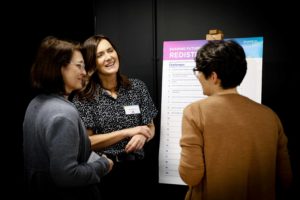
SHARECITY received funding from a European Research Council Consolidator Grant Scheme under Horizon 2020. PI Anna Davies shares her experience of leading a project of this scale, offers advice for other researchers and lets us in on her future plans:
Reflecting on your experience as PI of an ERC-funded Horizon 2020 research project over the past five years, what were the high points? What were the biggest hurdles you came across?
AD: There have been many great aspects to the SHARECITY experience, from the excellent early career researchers who participated across the five year programme, to working with the many inspiring food sharing initiatives around the globe focused on collaborative acts around food. The project set ambitious goals and I’m happy to say that we’ve been able to follow through on them all, but there’s much more to come and SHARECITY outputs will be forthcoming for many years. Of course, it’s not been all plain sailing; research never is. For example, there were challenges around supporting a team located around the globe during fieldwork, although it turns out this was good training for COVID! Other than that, my biggest challenge has been time; there’s never been enough hours in the day or days in the week to do everything I’d like to with SHARECITY.
What advice would you give to researchers applying for similar grants?
AD: I’d say take the time to really think about and plan for what you’d like to do for the next five years (and more) and go for it! Talk to people who’ve run projects and learn from their insights. Finally, build in time for communication and engagement of your research findings, even if that’s not a major focus of your scientific approach as it will reap rewards you’ve never even thought of!
If you had to sum up the overall learnings arising from the research in a couple of sentences, what would they be?
AD: Contemporary food sharing is not the holy grail for sustainability, but it is a vibrant space for prefigurative practices, many of which are directly aligned with diverse dimensions of sustainability. However, the impacts they create are rarely visible to people outside direct participants. More than this, food sharing’s impacts, and particularly the social impacts of sharing, are hardly ever valued in a system dominated by commercial exchange which treats food primarily as a commodity. Until this changes, many food sharing initiatives will continue to operate in a precarious liminal zone seeking to transition from a flawed but still dominant present towards a desirable sustainable food future.
What’s next – what are your hopes for new research agendas arising from this work?
AD: On a practical level, there’s much more to do with the data gathered within SHARECITY. There’s still a whole bunch of papers in the pipeline, with some stuck in a COVID-19-constrained publishing world. Beyond ensuring these outputs get to see the light of day, we’re going to explore further the novel processes around fair futuring for sustainable urban food systems that we’ve developed and over the next twelve months we’re piloting SHARE IT with smart districts in Dublin. We’re really looking forward to working with Dublin City Council and the SFI ENABLE spoke on this endeavour.
Given international commitment to achieving the SDGs, we are also keen to communicate the impacts of sustainable food sharing to governments at all levels, and explore with policy makers and shapers possibilities for developing a more supportive policy infrastructure for sustainable urban food that takes food sharing seriously.
Beyond SHARECITY, there’s considerable scope to dig deeper into the social innovations around urban food sustainability and resilience, particularly in terms of living well with and (hopefully) after COVID-19. Established business models need to be revisited and market (and non-market) conditions reconfigured with sustainability at the centre.
SHARECITY in Figures
This infographic summarises our outputs over the course of the project, 2016-2021:
Thank you for joining us on this journey. You can continue to access all our research and content through the SHARECITY website and make sure to follow the latest developments on Instagram and Twitter,
The SHARECITY Team.
© 2015 - 2024 ShareCity | Web Design Agency Webbiz.ie
